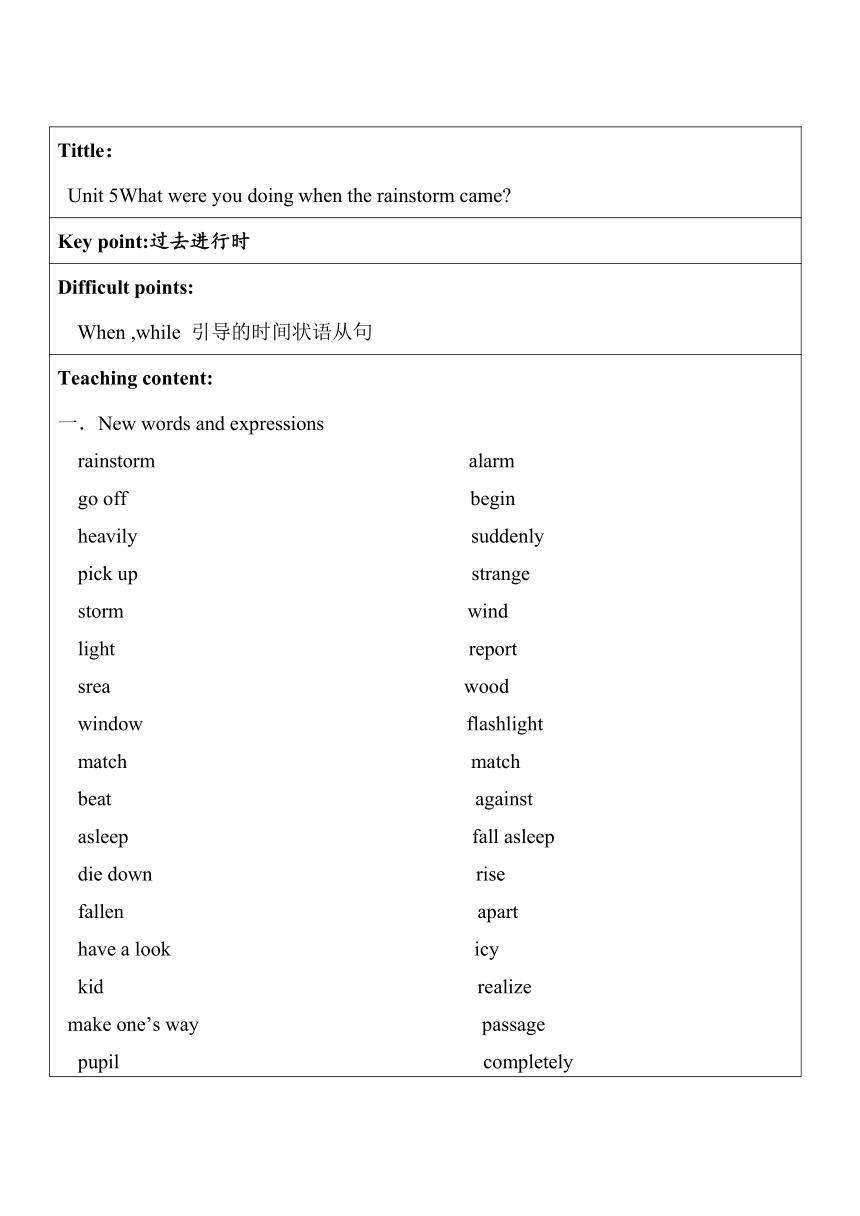
Tittle: Unit 5What were you doing when the rainstorm came Key point:过去进行时 Difficult points: When ,while 引导的时间状语从句 Teaching content: New words and expressions rainstorm alarm go off begin heavily suddenly pick up strange storm wind light report srea wood window flashlight match match beat against asleep fall asleep die down rise fallen apart have a look icy kid realize make one’s way passage pupil completely shocked silence in silence recently take down terrorist date tower at first truth 二: Target language What were you doing at eight last night I was taking a shower. What was she doing at the time of the rainstorm She was doing her homework. What was he doing when the rainstorm came He was reading in the library when the rainstorm came. What was Ben doing when it began to rain heavily When it began to rain, Ben was helping his mom make dinner. What was Jenny doing while Linda was sleeping While Linda was sleeping, Jenny was helping Mary with her homework. Language points What were people doing yesterday at the time of the rainstorm (1) 过去进行时表示在过去某个时刻或过去某一时间段内正在进行的动作 结构:S+was\were +doing 翻译:昨天晚上九点你正在干什么?那时我正在看电视。 (2)at the time of 在....的时候 翻译:在写作业的时候一定要专心。 Tell us what happened yesterday morning. happen: 发生 不及物动词 Sth+happen +地点\时间 某地、某时发生某事 翻译:昨晚我们居民区发生了奇怪的事情。 sth.+happen +to sb. 某人出了某时,常指不好的事发生在某人身上。 翻译:昨晚,他发生了一场车祸。 Sb.+happen +to do sth. =It happens\happened that某人碰巧做某事 翻译:我碰巧身上没带钱。 happen 与take place: 两者都是不及物动词,不可用于被动语态。 happen 强调某事发生的偶然性,而take place 常表示事情是事先经过安排,有计划、有预谋的发生。 e.g.The Olympic Games take place every four years. I called at seven and you didn’t pick up.我七点给你打电话,你没接。 pick up的多种含义: 接收; 拾起,捡起; 用车接,让别人搭便车; 学会、学到; 收拾、整理; 感染(某种疾病); 翻译:他用收音机收听英语节目。 他在路边捡了一个钱包。 我妈妈每天在校门口接我。 她在巴黎工作期间学会了法语。 你最好把卧室里的东西整理一下。 她感染上了H7N9。 I called again at eight and you didn’t answer then either. 区分:also , too , either , as well also用于肯定句中,一般放在be动词或助动词之后,行为动词之前。 too “也” ,用于肯定句或疑问句中,放在句末,前面用逗号隔开。 either 用于否定句中,放在句末,前面用逗号隔开。 as well 用于肯定句,常位于句末,前面不用逗号隔开。 翻译:我不会游泳,她也不会。 我是一个学生,她也是一个学生。 他也是一个好学生。 我喜欢水果,我也喜欢蔬菜。 So while you are sleeping ,I called Jenny and she helped me. ①when引导的时间状语从句中的动词可以是非延续性动词,也可以是延续性动词。 while从句中的动词必须是延续性动词。 ②when 说明从句的动作和主句的动作可以是同时,也可以是先后发生;while 则强调主句的动作在从句动作的发生的过程中或主从句两个动作同时发生。 ③由when引导的时间状语从句,主句用过去进行时,从句应用一般过去时;如果从句和主句的动作同时发生,两句都用过去进行时的时候,多用while引导 ... ...
~~ 您好,已阅读到文档的结尾了 ~~